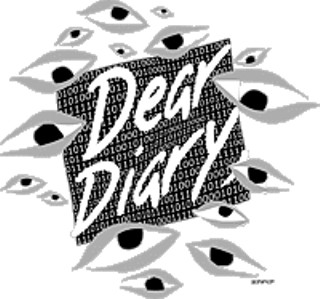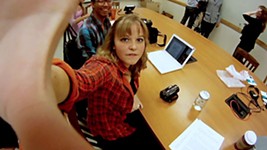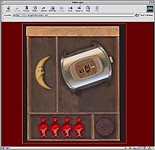Dear Everyone ...
Online Diarists Show Us a Little More
By Kim Mellen, Fri., Aug. 4, 2000

Al's question of the day, which he sends via e-mail to a group of people who share his obsession, is whether making a little money from their writing is contrary to the spirit of their genre. Almost instantly after the question shows up in the in-boxes of the list subscribers, the responses start rolling in. "It should be a labor of love and not a revenue generator," claims Michael. "It doesn't cost much, if anything, and if you're not putting your time into it because you enjoy it, you shouldn't be doing it." Katie disagrees. "Street musicians, piano players, and really annoying mimes all put out collection jars and I don't feel compelled to tell them where to stick their stupid jar," she explains. "If people want to put out the online equivalent of collection jars, that's fine, more power to you."
The issue is also being hashed out over at Beth Campbell's forum, a Web bulletin board where anyone can discuss current world events or post their thoughts on Beth's latest update (or their thoughts on somebody else's thoughts on Beth's latest update). Campbell, known to her readers as Beth or Lizzie or Xeney, is the catalyst of the debate; it is she who has just added a small, unobtrusive button to her site that enables visitors to donate money to her via PayPal (a site through which credit card transactions can be made). Keeping a high-volume, high-maintenance site like hers isn't cheap, and she wants to offset some of the cost. Over one short morning, as a flame war erupts over whether this is commercialism, and whether this writing can cross that unholy divide with its soul intact, fans put enough money into Beth's virtual tip jar to pay for five months' worth of site hosting.
What Beth and Michael and Katie and Al write is a form that most people have themselves undertaken: the diary. The twist is that their diaries are not kept under lock and key, stashed under a mattress -- they are, in fact, published online for the whole world to read.
Apart from a few common characteristics -- strong opinions and exhibitionist tendencies -- they are as different as Bob Packwood's diary is from Anne Frank's. The "online diarist community" is really only tied together by their method of disclosure, governed by a loosely conceived and oft-flouted bundle of unwritten standards. Most keep every entry online, no matter how embarrassing. Some update daily, most every other day or so. (Going on a temporary vacation is a sure way to lose readers' attention permanently.) Some writers reveal their name, location, and employer freely; some write under a pseudonym. Some online diaries amount to columns with a personal bent that you might read in your daily paper; some are Marquis de Sade-like memoirs that make you gasp with the sordid, self-indulgent drama of it all.
Since most prominent online diarists are of the former school, you'll often find the term "online journals" (OLJs for short) used instead of "online diaries." Even if Webster deems the two synonymous, the term "journal" has a newsier, less-intimate connotation -- that's why The Wall Street Diary sounds weird. (On the other hand, online diarists don't want to be confused with news journalists, so they call alternatively call themselves journalers.) Whether a diarist -- or journaler -- espouses his or her opinion about the daily news, relates the events of a party, reveals masturbation habits, or all of the above, the best are the ones who can deftly spin a story: their story.
Inner Net Journey
The first online diary is attributed to Carolyn Burke, whose first entry is dated January 3, 1995. On the Online Diary History Project (www.diaryhistoryproject.com) -- a site launched last month for online chroniclers to chronicle their own chronicling -- Burke explains her decision to share her life via the Web. "An online diary, a place that exposed private mental spaces to everyone's scrutiny, seemed like a social obligation to me. I felt at the time that I could give back to society something important: a snapshot of what a person is like on the inside. This is something that we don't get access to in face-to-face, social society. Our intimacies are hidden, and speaking of them in public is taboo. I questioned the taboo. I disagreed with it."
Others did, too, and soon followed suit -- Willa Cline, Diane Patterson, Kymm Zuckert, Gus Mueller, and Justin Hall (see "Eight Prominent Online Diarists") -- riding the wave of enthusiasm that accompanied the Web's earliest public rumblings. For them, the question wasn't so much why put their lives online, but why not? Of course, the disadvantages of exposure and self-created celebrity quickly became apparent. When you open your window shades and welcome the gaze of voyeurs, you have to make sure they can't see your family sitting in the living room, and you have to make sure friends know when they're falling within the binoculars' sightlines. At some point in their online odyssey, every diarist has asked this question: How much is too much? Shield loved ones from the scrutiny or deal with the fallout? A handful of diarists, choosing the latter, have lost friendships, lovers, and have even been fired from their jobs.
And then there's the issue of dealing with the audience. It's common for readers to offer unsolicited advice, or attempt to make exposure a two-way street with a barrage of e-mail about their own problems. Less commonly, but still a concern to many diarists, is when readers breach the comfortable distance provided by computers with phone calls or uninvited visits. While diarists can take precautions against these sorts of invasions, troublesome behavior from readers can take unpredictable and surprising forms. In one notorious case, prominent online diarist Rob Rummel-Hudson wrote an entry that angered some members of the Michigan Militia, who caught wind of it and threatened to crash his upcoming wedding.
Considering these risks, naysayers are right to question the value of splaying the intimate details of one's life in such a public forum. After all, isn't it all just a part of the disturbing swell of consumers who crave the sordid confessionals on Jerry Springer, the weepy testimonials on Oprah, the human laboratories of The Real World, Survivor, and Big Brother, the corny pratfalls of America's Funniest Home Videos, and the shock of the sundry When Waiters Pee in the Soup!-type hidden camera expositions? Is everything private open to the public?
In the technical arena, at least, there's a reason behind this push. "Porn leads everything," says Pamela Ribon, an Austin-based online diarist. "Everything on the Net has been led by porn. You can watch what porn does, then we start doing it. Live feeds. Live chats. Paying. Banner ads. Pop-ups. Once it works for porn, it starts becoming okay for the rest of the Internet to do. ... The porn industry, besides being the Internet's biggest money-maker, is also very much a pioneer of where things head. TV is following porn, because we always want a little more. Show us a little more."
But there is value in online diaries beyond their base voyeuristic pleasures, and they certainly say more about human nature than the theatre of cruelty that is Survivor. Maybe it's true that there can be no pornography without exhibitionists, but diarists contend that their kind of exhibitionism is far from salacious. Many human endeavors, from wearing a spiffy shirt to hanging a painting in a gallery, from running for city council to shooting a three-pointer, involve some element of "Hey, look at me!" Most online diarists are upfront about their exhibitionism, and whether they should be admired or dismissed for cutting to the chase is, of course, up to the reader.
With the fashion maven or the artist, the politico or point guard, exhibitionism is tied to other motivations: finding a mate, putting food on the table, bettering a city, or edging a team toward victory. Online diarists, too, cite other reasons behind what they do. Keeping one might force them to write every day. It might be a way to learn HTML. It might be a way for them to keep in touch with families who live across the country or friends who live across town but whose e-mail they're rotten at returning.
But in this diverse mix of writing skills, intimacy levels, and motivations lies the core of what makes this phenomenon so extraordinary. Online diaries offer readers the opportunity to put themselves in the shoes of people similar to or very different from them, to experience somebody else's take on the world, to feel their triumphs and defeats or simply the neutral hum of their daily grind. In this way, digital diaries are tied inextricably to their analog ancestors; they spring from many of the same needs and compulsions that drive people to write private diaries. And perhaps nobody knows and explains those needs more eloquently than Thomas Mallon.
A Site of One's Own
An accomplished novelist and a prolific diarykeeper, Thomas Mallon published his treatise A Book of One's Own: People and Their Diaries in 1984 -- long before "Internet" was even a vocabulary word. In its introduction, he illuminates the motivation that fueled the writers of the hundreds of diaries he studied. "Time is the strongest thing of all, and the diarist is always fleeing it," Mallon writes. "He knows he will eventually be run to earth, but his hope is that his book will let each day live beyond its midnight, let it continue somewhere outside its place in a finite row of falling dominoes."
For traditional diarists, their writings are private, so publishing their musings for an audience seems to be the insurmountable distinction between them and this new breed of online diarists. But, according to Mallon, traditional diarists are never writing strictly for themselves. They're writing, unintentionally (and sometimes intentionally), to an audience. Even Anne Frank, after hearing a radio address by the exiled Dutch minister of education and culture calling for documents chronicling his people's struggles during the war, set to rewriting her diaries so they could be of use to posterity. When you discover your great-great grandfather's journals in the attic and turn their pages for the first time in decades, chances are he was picturing you, long before you were born, doing just that.
Today, from his Connecticut home, Mallon reflects on his theory. "At the time I wrote the book, it was a controversial theory that diarists unconsciously write for an audience. Some who write diaries were, and still are, appalled at the thought of someone reading them. But the audience that private (as opposed to online) diarists write for is very abstract, perhaps just a vague, posthumous one."
While it's true that the traditional diarist's audience is usually made up of phantoms of the future, it's also true that online diarists know a good portion of their audience only as a faceless bunch identified only by the string of numbers that a statistics-keeping program reports to them. In the case of diarists who write under pseudonyms and keep their practice a secret from those close to them, their entire audience is kept in the dark (and for those who argue over diarist vs. journaler terminology, these are the only true "diarists"). Whether or not the diarists know their readers' names and faces, there's always the sense that they are attempting to become bigger than what they are, to make their days live beyond their midnights. As the Internet speeds up the pace of life -- e-mail replacing letter-writing for so many people, eBay allowing us to get our hands on that comic book that's missing from our collection almost overnight -- it's no surprise that those writing to achieve a little piece of immortality would want the sensation immediately.
Mallon, for one, is suspicious of these motives, and wonders if online diarists are considering the bigger consequences of the movement they have wrought. "Technology has made everything more immediate. And that's somewhat terrifying," he says. "It once took absence to make the heart grow fonder, and the delay of gratification to fuel passion. By speeding everything up, technology may be undermining some of our basic emotional mechanisms. Online conversation makes connecting to others far easier than it used to be, but these 'connections' are rather generic and unreal. You're not risking very much when you form relationships online."
At least one longtime online diarist, Austinite Greg Bueno (see profile), says he often considers the consequences. "I've developed very strong hermit-like tendencies, and I'm very aware of it. It's always been in me, but the computer has made it more pronounced. People start relying on these superficial connections over the computer, and what does that spell for us as a society? I'm not a very outgoing person, and there's times I've wanted to be a recluse. But I don't want to take it to that extreme. I want to know what that line is and I don't want to cross it."
The pace of change on the Internet is lightning fast, and the practice of online diary keeping is still in its infancy. So whether Carolyn Burke or Thomas Mallon is right -- whether the online world is the only place people can make real connections, or only good old-fashioned flesh-and-blood society can provide that -- remains to be seen. It's simply too early to tell whether the ever-increasing numbers of online diarists are proving an exception -- or even an antidote -- to the isolating effects of technology. Certainly, as the amount of technical knowledge needed to post on the Web decreases, it will only translate to more people using the medium to bare their souls to strangers. However the future unfolds, diarists are certain to be there to record it. ![]()










